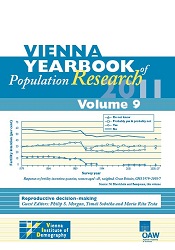 |
Vienna Yearbook of Population Research 2011
|
 |
Verlag der Österreichischen Akademie der Wissenschaften Austrian Academy of Sciences Press
A-1011 Wien, Dr. Ignaz Seipel-Platz 2
Tel. +43-1-515 81/DW 3420, Fax +43-1-515 81/DW 3400 https://verlag.oeaw.ac.at, e-mail: verlag@oeaw.ac.at |
|
||||||||||||||||||||
|
DATUM, UNTERSCHRIFT / DATE, SIGNATURE
BANK AUSTRIA CREDITANSTALT, WIEN (IBAN AT04 1100 0006 2280 0100, BIC BKAUATWW), DEUTSCHE BANK MÜNCHEN (IBAN DE16 7007 0024 0238 8270 00, BIC DEUTDEDBMUC)
|

Vienna Yearbook of Population Research 2011, pp. 207-226, 2012/02/02
doi: 10.1553/populationyearbook2011s207

This study investigates whether the fertility behaviour of significant others, in particular of one’s parents and siblings, affects individuals’ own fertility intentions and behaviour. Using the data of three cohorts of young Germans, we test the hypothesis that ‘contagion’ by siblings with young children explains the transmission of fertility patterns across generations. In theory, transmission might be explained by contagion, or transmission and contagion might operate independently of each other. The results show strong evidence for the transmission of fertility intentions and behaviour from parents to their offspring. Evidence for contagion by siblings is weak and contagious effects therefore do not explain transmission.
Published Online: 2012/02/02 15:29:57
Object Identifier: 0xc1aa5572 0x002a70fc
Document viewed: Calculating...
Rights: All rights reserved. For questions regarding copyright and copies please contact us by email.
